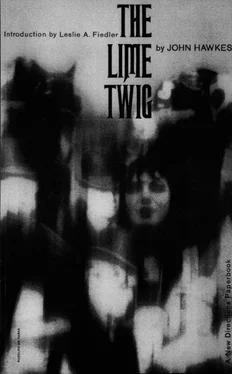It was 4 A.M. in the darkness that had begun with bees and warbling and the fading of bells, and Thick had used the ropes. Now she was bound, her wrists were tied together to the bedpost of brass, and Thick was snoring. He had somehow got her back into the white gown but had left the ties unfastened. It hardly covered her and despite the pain she could feel the gauzy touch of the old hat against one bare leg. Despite the darkness of the night she could faintly see the shreds of the long tasseled gown which he had ripped with his knife, muttering, “… Try to get big Thick in trouble, eh, try to make Thick look a fool. …” and had strewed viciously about the room, across the floor. A torn piece of the bodice was hanging over the closet door. And the little steamer trunk — how desperately she had found it, rummaged through the clothes of the long-dead woman. Cursing her, he had locked the little steamer in the cellar. Locked all escape away, then beaten her. And she had gone unconscious for an hour, for several hours, but there was no sleep for her. A bed she could not know— upon it violence that seemed not meant for her — this hour in which she could not sleep, arms drawn back and flesh captured with Thick’s rope, so tightly that her hands were cold: she knew now the hunger of the abducted, knew how the poor girls felt when they were seized.
Four A.M. and she was one of the abducted. She wanted to stand at the window, hear a voice through the wall, find a flower pressed between the pages of a book, eat from a plate she recognized. But there was only the darkness smelling so unfamiliar and the ropes that cut and burned. She knew there was enormous penalty for what they had done to her — but she could not conceive of that, did not require that: she only wanted a little comfort, a bit of charity; with the awfulness, the unknowable, removed. Once when a girl — and she had been a girl — they had sent her away somewhere, and now the soreness, the sleeplessness, the sensation of invisible bruises reminded her of the hearth with an uneasy fire on it and an old woman threading buttons, an endless number of buttons — blue and white and violet — on a string. She was a child anything could be done to — and now, now a docile captive. And when Monica, the little girl, awoke about this hour with her nightmares, Margaret took them to be her own bad dreams, as if in soothing the child she could soothe herself.
But it wasn’t soothing she wanted, it was a task or other to do. She hadn’t believed Thick’s beating, really, though it put her out for an hour or more. Later, lying strapped to the bed, she told herself it was what she might have expected: it was something done to abducted girls, that’s all. She thought she had read a piece about a beating. And yet when it came it surprised her. Though thinking now, listening, looking back through the dark, she realized — this despite the article she had read — it was something they couldn’t even show in films.
Because his sweat smelled raw when he tied her. And because after that, after he had grunted making the knots and cursed carrying the trunk down, he had become silent and watched her for a while, his precious radio telling them the time and starting a symphony, and then he had told her he might have to tape her mouth and she hardly heard it, listening to the low music and still feeling the hurt in her wrists and to herself considering that never before had her hands been tied.
And he remarked: “You don’t look half bad. Like that. …”
But he hadn’t forgiven her, because it was then that he stepped nearly out of sight across the room and she, hurting in the armpits as well as wrists, decided to try just how much freedom she really had — with only her arms drawn back to the post — and flexed a knee, the other knee, moved one foot far on the mattress and rolled her hips as much as she could. Until something told her she was being watched by Thick.
Then he came at her with the truncheon in his hand— it made her think of a bean bag, an amusement for a child — and wearing only his undervest and the trousers with the top two buttons open. He was in his stockinged feet and cigarette smoke was still coming out of his nose. She could see the dial of the little dry-cell radio in his glasses.
“I’ve beat girls before,” whispering, holding the truncheon in the dark, bracing himself with one fat hand against the wall, “and I don’t leave bruises. When it’s done you won’t be able to tell, you see. Plenty of girls— maids, the nude down in Robin’s Egg Blue, the tarts who run the stitching machines, a kid named Sally. Used to operate in Violet Lane, I did. Gaslight scenes is my attraction. And if I happened to be without my weapon,” raising a little the whiteness, the rubber, “the next best thing is a newspaper rolled and soaking wet. But here, get the feel of it, Miss.” He reached down for her and she felt the truncheon nudging against her thigh, gently, like a man’s cane in a crowd.
“It ain’t so bad,” he whispered.
She was lying face up and hardly trembling, not offering to pull her leg away. The position she was tied in made her think of exercises she had heard were good for the figure. She smelled gun oil — the men who visited the room had guns — and a sour odor inside the mattress. Perhaps the little one called Sparrow had left it there. Or even Thick, now standing beside her in the dark, because Thick liked to sleep on it in the afternoons. She remembered how earlier he had slept and how, after she and the child returned to the table, Monica had found a jack, as she thought she might, and won the game. And now, hearing the music, the symphony that old men were listening to in clubs, now she no longer would be able to play with Monica. She cared for nothing that Thick could do, but she would miss the games. There was a shadow on the wall like a rocking chair; her fingers were going to sleep; she thought that a wet newspaper would be unbearable.
Then something happened to his face. To the mouth, really. The sour sweat was there and the mouth went white, so rigid and distended that for a moment he couldn’t speak: yet all at once she knew, knew well enough the kinds of things he was saying — to himself, to her — and in the darkness and hearing the faint symphonic program, she was suddenly surprised that he could say such things.
His arm went up quivering, over his head with the truncheon falling back, and came down hard and solid as a length of cold fat stripped from a pig, and the truncheon beat into her just above the knee; then into the flesh of her mid-thigh; then on her hips; and on the tops of her legs. And each blow quicker and harder than the last, until the strokes went wild and he was aiming randomly at abdomen and loins, the thin fat and the flesh that was deeper, each time letting the rubber lie where it landed then drawing the length of it across stomach or pit of stomach or hip before raising it to the air once more and swinging it down. It made a sound like a dead bird falling to empty field. Once he stopped to increase the volume of the radio, but returned to the bedside, shuffling, squinting down at her, his mouth a separate organ paralyzed in the lower part of his face, and paused deceptively and then made a rapid swing at her, a feint and then the loudest blow of all so swiftly that she could not gasp. When he finally stopped for good she was bleeding, but not from any wound she could see.
For how many minutes he had kept it up, she did not know. Nor how long ago it was when he started. Because when she first opened her eyes he was snoring and the radio had changed. Comics were talking and she could not understand a word of it. And because now she was like a convent girl accepting the mysteries — and still Thick snored — and no matter how much she accepted she knew it now: something they couldn’t show in films. What a sight if they flashed this view of herself on the screen of the old Victoria Hall where she had seen a few pictures with Michael. What a view of shame. She had always dressed in more modest brown, bought the more modest cod, prayed for modesty, desired it. Now she was hurt — badly hurt, she expected. And she remembered a woman in the basement flat being run down by a bus and telling it: and she felt that way herself — still bleeding — felt the damage deep inside, aching in unanticipated places, paining within. There wasn’t any Mrs. Stickley now, and that other woman — in the basement flat — had died.
Читать дальше












